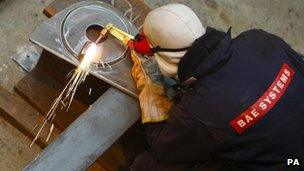BAE-EADS merger decision due as deadline looms
- Published

BAE and EADS must decide whether to proceed with their planned merger as a regulatory deadline looms at 17:00 BST.
The aerospace and defence deal looks likely to fall through, according to BBC business editor Robert Peston.
The UK, French and German governments have been holding talks to clear political objections over the merger.
The UK wants its counterparts to agree to limit their influence in the merged firm in order to maintain BAE's strong working relations with the US Pentagon.
Golden share
UK firm BAE Systems and Franco-German Airbus-owner EADS must decide by shortly after the end of the London trading day on Wednesday whether to ask the Takeover Panel for an extension to their $45bn (£28bn) merger talks.
UK Defence Secretary Philip Hammond has been meeting his French and German counterparts in Brussels. The merger needs the approval of the UK, French and German governments.
Only the French government has a direct stake in EADS, but Germany also exerts a high degree of control through the shareholding of German industrial group Daimler. The British government is able to veto any deal through its ownership of a "golden share" in BAE.
Our correspondent says the German and French governments must agree to limit their stake in any merged company, but that the outlook on Tuesday night was not good.
"BAE's board has made it an absolute condition for the transaction that the French and German governments should never own more than 9% each of the merged outfits, that they should not vote as a bloc and that they should not have representatives on the holding company board," he said.
"My sense from those close to the negotiations is that the collapse of the deal is the most likely outcome."
He says he has been told that Germany has dug its heels in, and although talks between the governments are set to continue this morning, there is a strong chance that the companies themselves may choose to terminate the deal.
More hurdles
Since the merger talks between the two company bosses first became public on 12 September, they have become bogged down by wranglings between their respective governments.
On Tuesday, EADS had denied that talks were set to collapse, stating that France and the UK had made "significant progress" over key issues.
Ministers in the UK believe there are potential benefits to the merger which could open up new defence markets. But unless they are satisfied that national security and the relationship with the US are protected, they could still block the deal.
On Friday evening, 45 Conservative MPs wrote to the prime minister voicing concerns over the planned deal, saying it would hand the bulk of Britain's defence industry to a company which would not safeguard UK interests.
Earlier, Chancellor George Osborne said the proposed merger must ensure British security and jobs are preserved.
Even if a political agreement is reached, the deal still faces other hurdles, including approval from the companies' shareholders.
BAE's largest shareholder, fund manager Invesco Perpetual, said on Monday that it had "significant reservations" about the proposed merger, and "does not understand the strategic logic" of the deal.
Invesco, which owns 13.3% of BAE, does not appear to be alone. More than 30% of the UK firm's shareholders have expressed qualms, the Financial Times reported on Tuesday.
Meanwhile, French media group Lagardere, who manages the French government's stake in EADS, has also claimed that the financial terms of the merger are unfavourable.
- Published10 October 2012
- Published10 October 2012
- Published8 October 2012
- Published7 October 2012